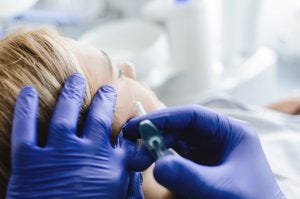Content Spotlight
Podcast: MilliporeSigma says education vital to creating unbreakable chain for sustainability
MilliporeSigma discusses the importance of people, education, and the benefits of embracing discomfort to bolster sustainability efforts.

AbbVie, a firm all too familiar with biosimilar threats, says the low risk of Botox competition was a factor in its decision to acquire Allergan.
The agreed $63 billion (€55 billion) megamerger with Allergan strengthens AbbVie’s pharma assets and provides the firm with a healthy growth platform, Bioprocess Insider reported last week.
Allergan’s lead product neurotoxic protein Botox (botulinum toxin) brought in $3.6 billion in sales revenue in 2018 and will add immediate add scale to AbbVie in neuroscience, as well as propel the firm into the medical aesthetic space.

Image: iStock/RobertoDavid
In a conference call to discuss the merger, AbbVie CEO Rick Gonzalez spoke about the unrivalled offering of Botox and its exclusivity as a focus throughout the firm’s due diligence and a factor in the acquisition.
“We spent a large amount of time analyzing product by product the Allergan portfolio to ensure that it hits the objectives that we had, and certainly one of the things that we looked at carefully is Botox,” he said.
“We looked at it from the perspective of both what was the risk of biosimilar coming to the market and what was the risk of other branded competitive alternatives entering the market.”
According to a recent Wall Street Journal article, as an anti-wrinkle treatment, Botox holds a 70% market share, ahead of Nestlé Dysport and Merz Group’s Xeomin, driven by the reasons Gonzallez pointed out.
Meanwhile, other competitors have suffered setbacks at bringing Botox alternatives to market, including South Korea’s Evolus which received a US Food and Drug Administration (FDA) Complete Response Letter (CRL) for its molecule DWP-450 (prabotulinumtoxinA) last year.
“If you look carefully at how Allergan has performed, I’d say they’ve done a very good job of protecting Botox. They’ve lost some share, but it’s relatively modest. And they’ve done an excellent job of protecting the brand, both through the brand presence as well as their bundling strategy, and a variety of other techniques that had worked quite well.”
One of the factors behind the Allergan deal is for AbbVie to escape its reliance on its blockbuster monoclonal antibody Humira (adalimumab). The product currently accounts for around 60% of AbbVie’s revenues, pulling in close to $20 billion last year, but has started to see erosion from biosimilar competition.
The first adalimumab rivals launched in Europe last year, and while AbbVie through litigation has avoided direct competition in the US so far, biosimilars are lining up to launch from 2023.
As such, Gonzalez said biosimilars “an area we know well” as he told stakeholders he is confident Botox will not be affected in a similar way.
“When you look at Botox it’s a very useful molecule,” he said. “It’s not very low characterized, and it’s in very low concentrations, and for a variety of technical reasons, I would tell you that it’s highly unlikely that we would see a biosimilar against Botox for a long, long time, if ever.”
You May Also Like